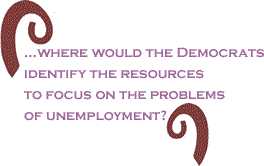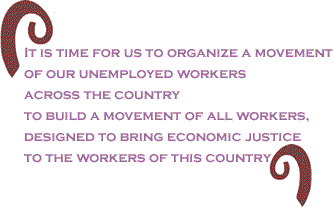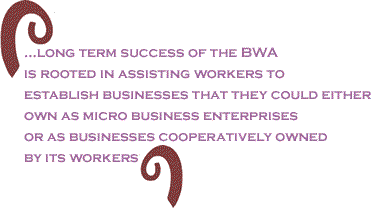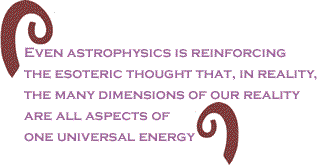
|
|||||||||||||||||||||
 |
|||||||||||||||||||||
 |
|||||||||||||||||||||
 |
|||||||||||||||||||||
 |
|
|
As an activist for over forty years and a City Councilor for the last seven, I am amazed at the lack of discussion within the Black activist community regarding the unemployment crisis facing our people. Professor Andy Sum of Northeastern University announced last summer, through the New York Times, after surveying unemployment in cities across the country, that unemployment among young Black and Latino males hovers at the forty to fifty percent level. A million men and women of African-American descent are in prison at a time when discrimination against those with criminal records is growing, particularly within the job sector. The growing number of Black high school dropouts across the country and the fact that the War on Drugs is continuing to send thousands of our young men to jail each year are indications that the unemployment crisis is going to worsen before it becomes better. Even within our most stable employment sector, Black unionized workers, the picture is bleak. The racial group suffering the most precipitous drop in union employment in this country during the last decade has been Blacks. In fact, the recent rise in unemployment is being attributed to a rise in the layoffs of Black workers. The auto industry has announced major layoffs soon to take place. Obviously, this will add to the unemployment crisis in the Black community, given the relatively high numbers of Blacks employed in the auto industry. The complexity of the problem increases when you look at government response to the problem of unemployment. At the federal level 0.3 % of last year’s federal budget (including entitlements) was invested in job training. The only government-financed job creation programs are the War in Iraq and Afghanistan and the increase in military spending. However, such job creation is in industries within the confines of the military industrial complex where relatively few Blacks are employed---aerospace, tool and die making, etc. While spending 50+ billion last year on education (the highest category of non entitlement social spending), the federal government invested $419 billion in Defense, which does not include the supplemental funding for the Iraq and Afghanistan wars. When Congress had to decide how to fund the “rebuilding of New Orleans” such as it is, they took ten percent off the social programs, which represent a third of the government’s discretionary programs.
Some of us hope that once the Democrats get into power, they will solve the problem. However, the reality of the situation is that it was President Clinton’s administration that engineered passage of major trade agreements that have led to an increasing export of jobs. Although President Clinton is out of power, the Democratic Leadership Committee that worked closely with Clinton on the formulation of these trade policies is still a major force within the Party. Ironically, nearly half of the members of the Black Congressional Caucus proudly list themselves as members. With a federal deficit of over $500 billion dollars, whose growth is fueled by the tax cuts for the rich and the growing Defense and war expenditures, where would the Democrats identify the resources to focus on the problems of unemployment? It is not clear that as a Party, they are moving to revoke the tax cuts or cut the military budget. In fact, Presidential candidate Kerry proposed spending more money on Defense than Bush, without answering the question of where he would find the resources to fund the social programs that he proposed. It is not surprising that we find ourselves in this situation. This country was founded on the idea that rich white males were the only ones suitable for citizenship and control of the life of the country. So, it is not surprising, that the Republicans and segments of the Democratic Party are not only trying to rip to shreds the social programs created by the Roosevelt administrations and the War on Poverty but also trying to destroy the power-political and economic-of all workers. What is surprising is the silence regarding this problem from Black activists and political leaders. As ridiculous as it sounds, it seems as if we have adopted “a crumbs from the table perspective”, hoping that the Democrats will come into office and improve things for all. The fact that our ministers are preaching from the pulpit against gay marriage (at least in Massachusetts) and saying nothing about our unemployment crisis is unfathomable. I know that many of you are saying to yourselves, “What about all the work that is going on to solve the issue of the reentry of those who have criminal records but find themselves barred from educational programs, publicly financed housing, and jobs because of incarceration. Isn’t this the protest and action that you are looking for?" I will readily acknowledge that this is a growing problem, given the numbers of us who have been and are now incarcerated. In fact, even an arrest without conviction can have a devastating effect on your employment possibilities.
I acknowledge the good work that is being done in Massachusetts as well as elsewhere on this issue. In fact, the City of Boston passed last year, what we believe is the first local antidiscrimination law regarding the hiring of those with criminal histories by those who do business with the City. However, while we have to continue the fight against this form of discrimination, we have to keep in mind that there is no way to solve the problem of reentry into society and economy for those who have been incarcerated if there is a growing scarcity of jobs. Given the above analysis of our unemployment problem, it is clear that we can’t look to the government, unchallenged, to solve this dilemma. It is also clear that we cannot look to the corporate sector. Given their growing lack of concern for the welfare of White workers, why would we assume that our welfare would be their concern? It is time, I believe, for us to recognize and act on the fact if change is going to come; we are going to have to be the catalytic force to bring it about. Fifty years ago, we stood up to the apartheid challenge of this country and with the help of allies triumphed while at the same time, sparking movements in almost every other sector of the population. It is time for us to organize a movement of our unemployed workers across the country to build a movement of all workers, designed to bring economic justice to the workers of this country. However, such a movement needs to have a vision that extends beyond obtaining government and corporate jobs. The thought that the strategy for our economic future
will continue to rely on gaining jobs from those who have historically
been indifferent if not opposed to our economic welfare does not
make sense. Therefore, while we need a movement of unemployed workers
across the country to The workers’ movement of the 21st century must recognize that reliance on corporate business owners or government bureaucrats for the infrastructure and quality of their economic life consigns their children to a probable economic future no better and probably worse than their own. Therefore, the political demands of such a movement would not only focus on laws which ensure fair and just treatment of workers and policies promoting full employment, but also the allocation of government resources to the support of the development of a cooperative business sector. Since the wealth of the capitalist sector is generated from government investment; it is time that the workers of this country gain such benefit from government spending. Perhaps, taxes then will not be viewed as a pariah.
While some may scoff at the thought that a strong cooperative business sector could ever develop with well paying jobs within this country, we need to keep in mind that we are not at the beginning of the development of the European corporate empire (which began in the 1500s), we are at the end, Thank God. While we are captivated by the seeming power of the corporate world, the reality is that it is consuming itself. Remember that the birth, growth, and degeneration cycle is part of the life process, even for corporate empires. If you listen closely to Bush, you can hear the death rattles. The war in Iraq highlights that the key strategic problem of the global economy and its masters is the cost of oil, particularly given the effect of high oil prices on the cost of transportation. As factories are located further and further from their markets, particularly in this country, the cost of the goods has to rise in order to cover the cost of oil as well as future workers’ demands in other countries for a larger share of the wealth they are creating. As the costs of the goods from the global economy rise, the opportunity for new business development becomes not only possible but also attractive. As the corporate empire loses energy, the energy of the local economy will fill the void. Remember, the classic physics dictum that nature abhors a vacuum. Since movements begin with local organizers testing new initiatives to deal with local problems, the leadership of the D7 Roundtable, a monthly popular education/public policy forum that I formed when elected seven years ago, last summer initiated an outreach program to assess the interest among the Black and Latino unemployed in forming such an organization. Since unemployment is a segment of our community’s life that is rarely a focus for organizing, it seemed that there would be an untapped reservoir of energy. The outreached supported the belief that there were unemployed workers ready to invest energy in building their own organization and in September of 2005, an Organizing Committee for the Boston Workers’ Alliance (BWA) was formed. The objective of the formation was to bring underemployed and unemployed workers initially from the Black community and communities of color together to fight for justice for those with criminal backgrounds, to fight for full employment policies, and to build an infrastructure. This infrastructure was designed to enable the organization not only to improve the politics of employment, but also develop the capability of placing workers and eventually developing jobs. Two days ago, a year after the launching of the Organizing Committee, the BWA held its first rally in the community with over two hundred people, young and old attending. Mixing food, music, and speeches about the reality of unemployment for those with criminal background as well as those without, the BWA leadership produced a cultural happening focusing the community’s attention on the needs of the workers of our community.
At the same time that the leadership of the BWA was developing an organizational infrastructure and the capacity of the organization to impact the problem of unemployment, D7 members and BWA members collaborated with the Industrial Cooperative Association (ICA), a local consulting firm that focuses on the development of worker owned business. This collaboration produced a feasibility study for the development of a nonprofit temporary job agency jointly controlled by the BWA and D7. Given the study, ICA, BWA, and D7 are now focused on raising the money necessary to capitalize the operation. With a temp firm in place by the middle of next year, the BWA will have a vehicle through which it can secure employment of its members through temp jobs as well as continue to work with them on skill and career development. However, while a vehicle to assist the employment of its members is an important step, there has been recognition since our first outreach meeting that the long term success of the BWA is rooted in assisting workers to establish businesses that they could either own as micro business enterprises or as businesses cooperatively owned by its workers. In closing, let me touch on two issues which, I believe, are key to the building and sustaining of a movement of unemployed workers which engages the energies of our people in developing a new economy beneficial to themselves as well as others. The first concern is that given the costs of living of the majority of our cities, such a movement will need to develop new communities. As an elected official, it is very clear, that there are many people, both young and old, to whom life in the city, given its pressures and costs, is a barrier to their development.
Therefore, a movement of the unemployed needs, I believe, part of its energy to be focused on the development of new communities that can give an opportunity for a re-creation of self for those of us who are dying mentally, emotionally, and spiritually in the cities. Through this re-creation of self, our marginalized not only will have an opportunity to develop themselves but also have an opportunity to see themselves in a new light. Keep in mind, that a local economy is strengthened by the increased productivity of each member. Therefore, as each member of a community has the opportunity to increase their productivity for the well being of themselves and their community, they have the opportunity to perceive their value in a way that goes beyond their material needs and desires. The second concern is that every system of oppression has not only a physical aspect but also a mental, emotional, and spiritual aspect. That is, oppression works most successfully when there is a belief system that reinforces on a mental, emotional, and spiritual level the oppression. In this country, the doctrine of White Male Supremacy has played that role. It has tied the White worker to the White boss, through the indoctrination of the worker with the thought that while you might not have all you want or even need, at least you are White and therefore part of the group in power by God’s design. (Has it occurred to you that the religious right of the Republican Party is in fact a recreation of the Dixiecrat wing of the Democratic Party?) The effect of this pernicious doctrine of racial supremacy on Blacks has been, I believe, to stunt our mental, psychological, and physical development. That is, the doctrine of supremacy reinforced through political, economic, and social oppression, induces a type of psychosis, where many of us actually begin to believe in our innate inferiority and subconsciously act out the belief system that bombards us on a daily basis with the message that we are less than. Part of the process of cleansing our energy system of the affects of the Doctrine of White Male Supremacy necessarily involves increasing our valuing of ourselves through our contribution to our personal well being as well as the well being of our family and community. However, because the Doctrine is an idea that is reinforced by our educational institutions, media, arts, etc. and defines the effects of oppression as the innate nature of the oppressed, we need to mentally deconstruct the idea. While this mental deconstruction is a complicated process, I believe that an essential component is the development of a cosmological perspective. That is, each of us must be encouraged to develop our own view of our relationship to the cosmos-the energy within and outside of our solar system and the myriad stellar systems, circling within that energy.
The West’s system of higher education has avoided these issues and allowed religious metaphors to obscure the reality of the identical relationship of each and every being to the cosmos. However, the esoteric writings of religion systems of the East and the West seem to agree on one idea---that each human being is surrounded by fields of energy and that within the field of energy, with the fastest rate of vibration, is a unit of energy that is a microcosm of the macrocosm, called God, Allah, Jehovah, The All, etc, depending on your religious perspective. While these esoteric teachings differ in methods of affecting a synthesis between the microcosm and the macrocosm, they all agree that the purpose of our “life experience” is to affect a synthesis between our human consciousness and the indwelling God consciousness. However, they also acknowledge that each human being’s climb on the ladder to God consciousness is a laborious one, covering many lifetimes through the process of reincarnation. The esoteric teachings do not contradict the more recognized religious teachings on the relationship between Man, God, and God’s creation, the Cosmos, However, they give more clarity on the process and purpose of human evolution---the ascent to God consciousness. Some may choose to turn away from this part of the strategy, believing that to even explore the question will bring confusion and division. However, if the purpose of a movement of the unemployed is to enable them to begin a process of recreating the economy in a way that works for all, then there needs to be a philosophical basis of such a movement that enables it to build on a foundation of universal principles that benefit all, not just a certain few. Even astrophysics is reinforcing the esoteric thought that, in reality, the many dimensions of our reality are all aspects of one universal energy. Or as Donny Hathaway sang so eloquently-Everything is Everything. It is time for the workers of the world to unite in the sharing of their common wealth-their universal creative energy-their love from which flows creation on every level of reality. It is time for Black men and women to recognize our true inner nature and use that as the template for building a new self and a new world. BC Editorial Board member Chuck Turner is a Boston City Council member and founder of the Fund the Dream campaign. Turner has been an active force in progressive politics for decades. A vocal Boston activist since graduation from Harvard, Council Member Turner now represents Boston’s district 7, which includes parts of Roxbury, Dorchester, the South End, Kenmore and Fenway. He is the Chair of the Council’s Human Rights Committee, and Vice Chair of the Hunger and Homelessness Committee. He has most recently been involved in an effort to block the construction of Boston University’s Biosafety Level 4 Laboratory. |
|
| Home | |
Your comments are always welcome. Visit the Contact Us page to send e-Mail or Feedback or Click here to send e-Mail to [email protected] e-Mail re-print notice
If you send us an e-Mail message we may publish all or part of it, unless you tell us it is not for publication. You may also request that we withhold your name. Thank you very much for your readership. |
|
| October 12, 2006 Issue 201 |
||||||||||||||
|
||||||||||||||
|
||||||||||||||
| Printer Friendly Version in resizeable plain text format | ||||||||||||||
 |
||||||||||||||
 |
||||||||||||||
 |
||||||||||||||
 |
||||||||||||||
| |
||||||||||||||
| |
||||||||||||||



































